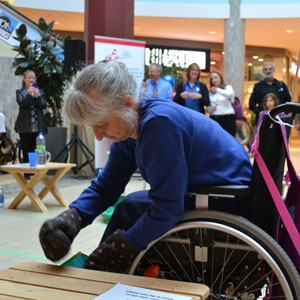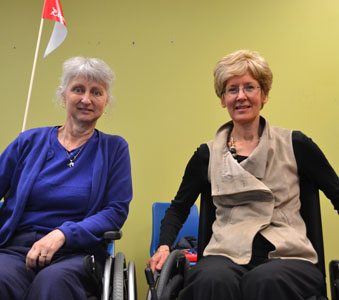On Monday, May 27, Dal faculty member Dr. Tanya Packer spent a day looking at her life from a different perspective — one with four wheels.
Dr. Packer was one of 12 local business people, professionals and community leaders who participated in Halifax’s Chair-Leader campaign as part of a nationwide fundraising and awareness initiative organized by the Canadian Paraplegic Association.
Wheeling around campus was Dr. Packer’s way of promoting accessibility and respect for wheelchair users.
Day-to-day obstacles
After going about their usual routines, the Chair-Leaders finished their day with a little friendly competition at the Halifax Shopping Centre, navigating their chairs through an obstacle course that featured some of the daily challenges faced by mobility challenged people.
‚ÄúI felt a little bit like I was on [the television show] Undercover Boss,‚Äù laughed Dr. Packer, the director of ª∆…´÷±≤•‚Äôs School of Occupational Therapy, when she spoke at the end-of-day reception.
 As an occupational therapist, Dr. Packer has prescribed chairs, fit them and taught people how to use them, but experiencing things first-hand brings a different perspective. As a professor, she teaches students about wheelchair usage and accessibility issues. ª∆…´÷±≤• a half dozen of these students cheered her on during the obstacle course.
As an occupational therapist, Dr. Packer has prescribed chairs, fit them and taught people how to use them, but experiencing things first-hand brings a different perspective. As a professor, she teaches students about wheelchair usage and accessibility issues. ª∆…´÷±≤• a half dozen of these students cheered her on during the obstacle course.
“The pressure was on for me,” she said, laughing. “I’m supposed to know how to do this.”
Dr. Packer had no need to worry, claiming the victory in her heat after completing such tasks as picking keys up off the floor and packing a grocery bag while wearing oven mitts.
More than a physical challenge
Earlier in the day, Dr. Packer attended convocation in her chair and, despite having to deal with her gown getting tangled in the wheels, she found the event hassle-free. She explained that the team with the Registrar’s Office that manages convocation was very accommodating as far as making space for her on stage.
However, she believes that there are always improvements that can be made to increase the accessibility of any building. For example, many ramps in Halifax are built to match minimum code requirements, but the code often allows ramps that are still too steep for many wheelchair users to easily ascend/descend.
The general agreement among all Chair-Leaders was that they realized what they take for granted physically and noticed how people treated them differently socially.
“The thing that’s the most interesting is not the physical stuff,” said Dr. Packer. “It’s that I really don’t like not being on eye level.”
She noticed this altered perspective at a luncheon preceding convocation when she had to give a speech to a room full of people looking down at her as they stood to listen.
Experiencing compassion
 Last year’s Dal Chair-Leader, International Centre manager Pam Williams, was interested in experiencing a day in a wheelchair since two of her family members, including her father, are confined to wheelchairs. Unlike Dr. Packer, she had never sat in a wheelchair until that day.
Last year’s Dal Chair-Leader, International Centre manager Pam Williams, was interested in experiencing a day in a wheelchair since two of her family members, including her father, are confined to wheelchairs. Unlike Dr. Packer, she had never sat in a wheelchair until that day.
“I think what it’s done for me is it’s brought me closer to my friends who are in chairs and really opened the conversation as to what life is like in a chair,” said Williams as she helped Dr. Packer at this year’s obstacle course and reception.
Since her day as Chair-Leader last September, Williams has had the International Centre add traction to the ramp leading into the building.
“Experience gives compassion,” said Williams. “Mine made me more conscious.”
She advises people to not be afraid to offer help to community members who are mobility challenged.
New education, new attitudes
Nova Scotia has the highest numbers of persons in Canada, per capita, who are mobility challenged. Dr. Packer explained that in a recent study, about 20 per cent of mobility challenged people were found to be housebound because they cannot get around in their communities.
Lee Kirby, a Dal professor in physical medicine and rehabilitation, is working to improve these statistics. A volunteer who assisted with Chair-Leader day events, Dr. Kirby is currently working with an occupational therapist on a six-week intensive course module for students finishing their master’s degrees in Occupational Therapy.
The module will offer an additional certificate in wheelchair studies and teach students how to prescribe wheelchairs based on standards from the World Health Organization. Dr. Kirby has travelled all over the world providing this kind of training for less developed countries, but the intensive course at Dal would be the first of its kind in a developed nation.
Dr. Packer explained that it’s also important for occupational therapy students to learn how to do community accessibility audits, which assess how accommodating local areas are to mobility challenged residents.
She admitted that it was weird to stand up and get out of the chair to get in a car and to walk out of the chair at the end of the day. It reminded her of how many people don’t have that option.
“Just because you change the physical barriers doesn’t mean that attitudes change, but, if you change attitudes, physical barriers will change.”

